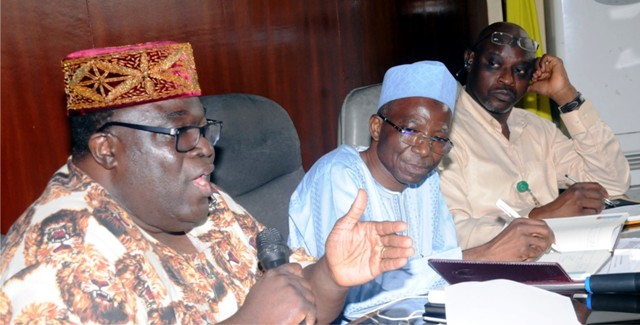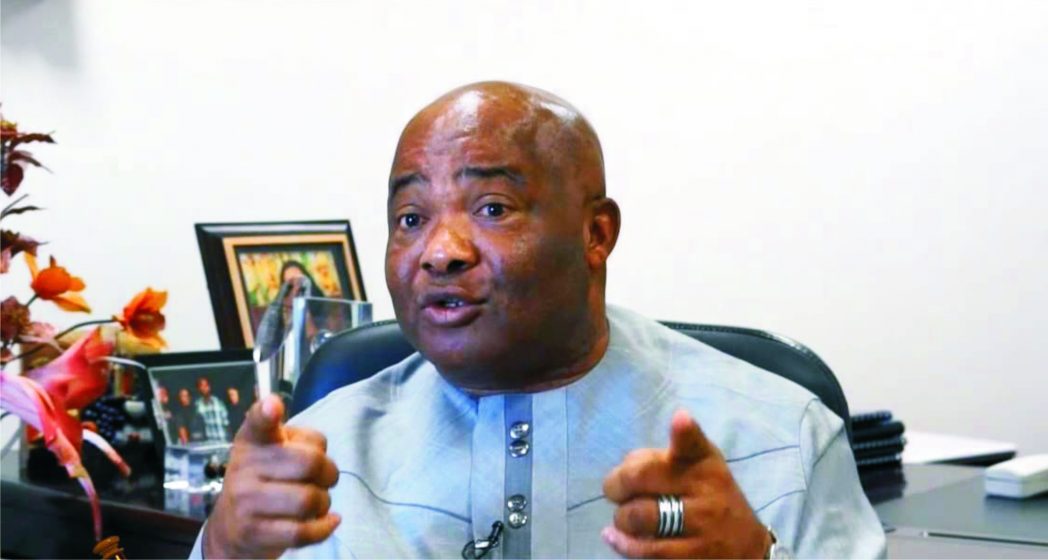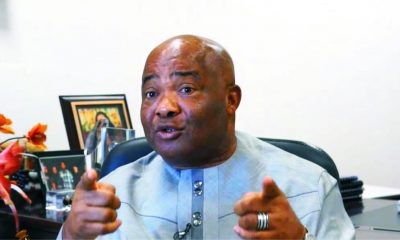Business
Ministry Trains 70 Officials On Change Management

The Ministry of Budget and National Planning has organised a workshop for no fewer than 70 officials to build their capacity on change management to enhance service delivery in the ministry.
The Tide source reports that the training was organised for the staff to build their capacity on various reform initiatives of the Federal Government.
Some of the participants, who spoke with our source after a five-day Specialised Change Management Training Workshop on Friday in Abuja, commended the government for organising the programme.
The participants, who preferred anonymity, said they were equipped with knowledge to be drivers of change in their various offices.
A participant from one of the parastatal agencies said that he learnt how to improve on service delivery by changing his attitude to work and be a good example in his office.
“We are lead reformers of change, agent of change; we have to be creative, add value to our work and be efficient,’’ he said.
Other participants also described the workshop as great and impactful.
They, however, expressed concerns that such workshop should be organised for management staff.
A female participant from the ministry said that the management staff should be trained on change management because they were the main drivers of change.
“We will not be able to implement what we have learnt here effectively if the management staff are not also equipped with same knowledge,’’ she said.
Similarly, a female participant from the ministry said that it was a great experience attending the workshop, saying: “presenters were great and resource persons were excellent as well.
“When we talk about change, it should start from management staff and go down to other staff.
“For example, there is a yearly meeting in the ministry – Joint Planning Board – I think every planning officer should be given privilege to attend it.’’
She, however, promised to share the lessons learnt from the workshop with her colleagues to see how they could be drivers of change in the ministry and national as a whole.
Earlier, the Permanent Secretary of the ministry, Mr Olajide Odewale, said Nigeria had been undergoing a period of change to restore the value of governance and adopt the best practice of doing business for the benefit of the country.
Odewale said that the need to change the old order and institute a more progressive, transparent and accountable leadership had made it imperative to embark on various reforms initiatives.
According to him, the various reforms initiatives by the government are driven by the ministry.
“ As a leading policy making and implementing institution in Nigeria, it is important that the ministry is properly equipped with human capital resources.
“It is important in order to be able to deliver on its mandate. This understanding has led to the various reform initiatives currently going on in the ministry.’’
The 70 participants on the change management workshop are from the Ministry of Budget and National Planning and its parastatal agencies.
They are National Bureau of Statistics, Centre for Management Development, Budget Office and Nigerian Institute for Social Economic Research. (NAN)
Business
Nigeria’s Gold, Other Solid Minerals Being Stolen – NEC

The National Economic Council has expanded the mandate of its Ad-hoc Committee on Crude Oil Theft Prevention and Control to cover illegal mining.
This is just as the council raised the alarm that the nation’s solid minerals, including gold, are being mined and stolen.
Imo State Governor, Hope Uzodimma, who chairs the committee, disclosed this while briefing State House correspondents after the 153rd NEC meeting chaired by Vice President Kashim Shettima at the Presidential Villa, Abuja, yesterday.
Uzodimma said the expanded mandate is part of the government’s efforts to curb resource theft and increase revenue from Nigeria’s solid minerals sector.
“The National Economic Council Ad-hoc Committee on Crude Oil Theft Prevention and Control, which I chair, presented an interim report today to the Council.
“NEC received our report with satisfaction and expanded our Terms of Reference to now also take interest in solid minerals, because our solid minerals are being mined and stolen and not adding to national revenue,” said Uzodma.
He noted that the expanded role would enable the committee to coordinate with the Ministry of Solid Minerals Development and other federal and subnational institutions to combat widespread illegal gold mining and other forms of mineral smuggling that have deprived the country of much-needed foreign exchange.
“Going forward, our committee, working with other government agencies, will look at how to ensure that the revenue of the country arising from solid minerals like gold and other forms of solid minerals are not allowed to be stolen,” the governor added.
NEC’s Ad-hoc Committee on Crude Oil Theft Prevention and Control was first established under former President Muhammadu Buhari in August 2022.
It was reconstituted under President Bola Tinubu in December 2023 with Uzodinma as chairman.
The committee was initially mandated to address the challenge of crude oil theft and pipeline vandalism.
Its creation followed rising oil theft that had crippled national production and forced international oil companies to shut down key pipelines.
At the time, oil production had crashed to around 700,000–800,000 barrels per day, far below Nigeria’s OPEC quota, costing the government billions of dollars in lost export revenue.
Uzodimma explained that through what he called a “collaborative approach” involving regulators, operators, and the security forces, the committee had helped raise daily crude oil production to over 1.7 million barrels per day in the past 22 months.
The governor stated, “Before May 29, 2023, when President Bola Tinubu was sworn in, our crude oil production was around 700,000 to 800,000 barrels a day.
“Working with stakeholders, the regulators, operators in the industry, and the Navy, we were able to involve all the governors of crude oil-producing states and raise different security organisations.
“You would agree with me that as I speak, daily production is now in excess of 1.7 million barrels a day, and cases of pipeline vandalism and vandalisation of oil assets have also been on the decline.”
The council, he said, was satisfied with the progress and decided to deploy the same model of intergovernmental coordination, private-sector partnership, and multi-agency surveillance to the mining sector, plagued by resource theft.
“We are determined to ensure that crude oil production and gas are properly preserved for the benefit of our citizens.
“Now, with this new directive, we will also protect our gold and solid mineral assets,” Uzodinma added.
Nigeria’s illegal mining economy, particularly in gold, lithium, and other high-value minerals, has grown into a multibillion-naira shadow industry.
According to data from the Nigeria Extractive Industries Transparency Initiative, the country loses an estimated $9bn annually to illegal mineral extraction and smuggling.
The Federal Government has linked several unlicensed mining operations to armed groups in the North-West and North-Central regions, where gold has become a source of illicit financing for bandits.
A 2023 NEITI audit also showed that over 80 per cent of mining activities in Nigeria were conducted informally, without licenses or environmental oversight.
In September 2024, the Ministry of Solid Minerals Development revoked over 900 dormant licences and announced plans for a national gold reserve policy. But enforcement remains difficult, with weak surveillance, limited manpower, and overlapping regulatory mandates.
According to Uzodimma, the expanded mandate aims to integrate the fight against illegal mining into the broader national resource protection framework previously used in the oil sector.
“We have done well,” he claimed, adding, “Among other things, we recommended that NNPC, working with security agencies and their consultants, should strengthen security in all the creeks and extend coverage to offshore regions. That will help in curtailing and supervising illegal entries and exits of vessels into our export terminals. This same spirit will now guide our solid minerals sector.”
The committee is expected to submit its first progress report on the expanded mandate at the next NEC meeting in November.
Business
NIMASA Marks 2025 Customer Week, Pledges Service Excellence

Business
SEME Customs Foils Smuggling Attempt Of Expired Flour, Seizes N2bn Contraband

-

 Nation3 days ago
Nation3 days agoNIOB President Calls For Innovation, Entrepreneurship In Housing Delivery
-

 News3 days ago
News3 days agoNLNG, NCDMB Unveil ICT Centre In P’Harcourt To Boost Tech Skills
-

 Business3 days ago
Business3 days agoNigeria’s Gold, Other Solid Minerals Being Stolen – NEC
-

 Niger Delta3 days ago
Niger Delta3 days agoOando Recommits To Education …Assures Continuous Partnership With RSU
-

 Politics3 days ago
Politics3 days agoReps Ask FG To Curb Arbitrary Rent Hike Nationwide
-
Opinion3 days ago
Fuel Subsidy Removal and the Economic Implications for Nigerians
-

 Featured3 days ago
Featured3 days agoFubara Pledges Cleaner Gateway To PH City …Visits New Dumpsite At Igwuruta
-

 News3 days ago
News3 days agoWAEC Conducts Trial Computer-based Essay Test Ahead Of 2026 Exams

